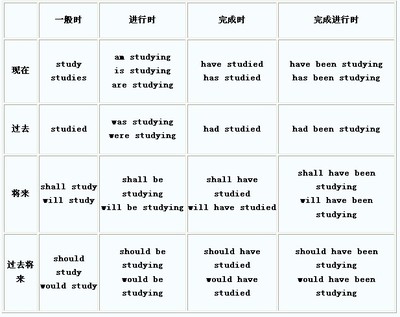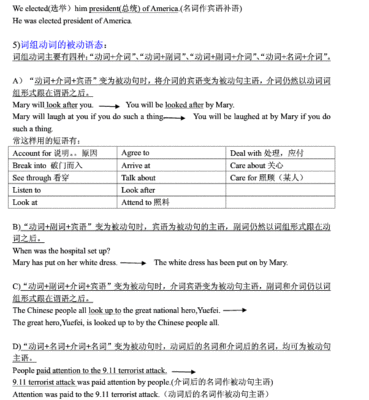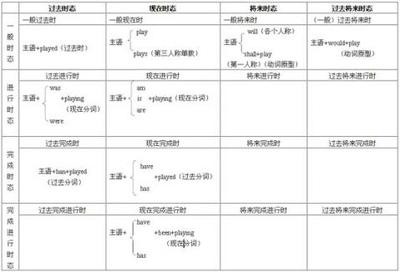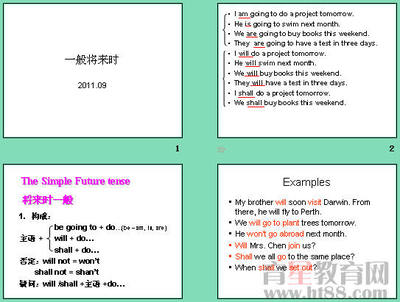在英语中,每句话都包含一定的时态,要学好英语就必须掌握英语中一些常用的时态。在英语中,不同时间发生的动作和情况,要用不同的动词形式表示.这种不同的时间和不同的动词形式就叫做动词的时态.换句话说,判断一个句子的时态,可以通过句子中的时间和动词的形态来判断。下面我就一般将来时作一些讲解,如有不妥之处,请指教。每种时态都有三个最基本的要素,分别是该时态的概念、结构、判断标志词。
一、 一般将来时的概念:
一般将来时表示将来某一时刻的动作或状态,或将来某一段时间内经常的动作或状态。
二、 一般将来时的结构:(有两类不同的结构)
Ⅰ 主语+shall(在英式英语中,只用于第一人称)/will(在英式英语中,用于第二、三人称)+动词(原形)【美式英语则不管什么人称,一律用will,因此美式英语只有一种结构:主语+will+动词(原形)】
肯定句式:主语 + will + 动词(原形)+ 其它.【主语+ will = 主语’ll】
否定句式:主语 + will + not + 动词(原形)+ 其它.【will not = won’t】
一般疑问句:will + 主语 + 动词(原形)+ 其它?
注:英式英语中现在也趋向于所有人称都用will,因此,现在比较少见到I shall或Weshall
Ⅱ 主语 + be going to +动词(原形)+其它.
肯定句式:主语 + be going to +动词(原形)+ 其它.
否定句式:主语 + be + not + going to +动词(原形)+ 其它.
一般疑问句:Be + 主语 + going to +动词(原形)+ 其它?
注:主语 + be going to +动词原形”表示即将发生的或最近打算进行的事。
三、 一般将来时的判断标志词
tomorrow , the day after tomorrow , next + 时间 ,in +一段时间 , in + 将来的年代 , at once , this afternoon , this evening , soon, in the future , some day , from now on , and soon.
四、一般将来时的基本用法
1.①表示将来发生的行为或存在的状态,常与tomorrow; in2020;next week(year ,month), from now on,soon, some day, the dayafter tomorrow,in(the)future, in five days(再过五天),in twoweeks(再过二星期)等表示将来的时间状语连用。
Will you be free tonight? 你今晚有空吗?
He will arrive here tomorrow morning.他将于明天早上到达这里。
Don’t worry. I will be back in threedays.别担心,我三天之后就回来了
②在时间状语和条件状语从句中,表示将来的时候,主句用一般将来时,从句用一般现在时:
When it gets warmer the snow will start tomelt.当气候变暖时,雪将开始融化。
I will go swimming if it doesn’t rain tomorrow.如果明天不下雨,我将去游泳。
2. 表示将来的常见方法
1)be going to +不定式,表示将来。
①与人连用时往往有“意图、意向、打算、目的在于……”等含义
We are not going to have a picnic. 我们不打算去野炊。
Are you going to buy him a gift? 你打算给他买礼物吗?
②根据客观的迹象预示着…
I’m going to leave at the end of this week.我打算在这周末离开。
Look at the clouds, --- there is going to be astorm.看那天上的云,怕是要下雨了。
▲ be going to与will有如下几点区别:
①be going to 表示近期、眼下就要发生的事情,will 表示的将来时间则可近可远,如:
She told him she was going to quit the job.她告诉他,她即将辞职不干。
He will write a book one day.
② be going to 表示根据主观判断将来肯定发生的事情,will表示客观上将来势必发生的事情。
He is seriously ill. He is going to die. 他病得很重。他就快死了。
Tomorrow will be Wednesday. 明天是星期三。
③be going to 含有“计划,准备”的意思,而 will 则没有这个意思,如:
She is going to lend us her book. 他准备把书借给我们。
He will be here in half an hour. 半小时后他将在这里。
④表达意图时:be going to do事先经过考虑的,而will do说话时刻临时想到的;表达预见时:be going todo有客观迹象作基础,而will do说话人的主观想法
We’re really lost. I’ll stop and ask someone theway. 我们真的迷路了,我要停下来问路。
I will try my best to help her. 我愿尽力帮助她。
五、一般将来时的特殊用法
1)go, come, start, move, sail, leave, arrive,stay、fly等可用进行时态表示将来,常有“意图”、“安排”或“打算”的含义。它常表示最近或较近的将来,所使用的动词多与移动、方向、启动等有关。如:
They are coming here this afternoon. 他们今天下午来这儿。
Mr. White is leaving for Beijingtomorrow.怀特先生明天将去北京。
▲ 也可用于某些非转移动词。如:
What are you doing next Sunday? 下星期天你打算干什么?
My mother is buying me a bike soon.我妈妈不久将给我买一辆自行车。
I’m meeting you after class.课后我要找你。
2)come, go, leave, arrive, start, get,stay等动词用一般现在时也可表示将来。
Because the shop is closing down , all the T-shirts are sold athalf price. 因为商店就要倒闭了,所有的T恤衫都半价出售
The meeting starts at five o'clock. He gets off at the nextstop.
六、 习题操练
一、单项选择。
( )1. There __________ a meeting tomorrowafternoon.
A. will be goingtoB. will going to be
C. is going tobeD. will go to be
( )2. Charlie ________ here next month.
A. isn’tworkingB. doesn’t working
C. isn’t going toworkingD. won’t work
( )3. He ________ very busy this week, he ________free next week.
A. will be;isB. is; is
C. will be; willbeD. is; will be
( )4. There ________ a dolphin show in the zootomorrow evening.
A.wasB. is going to have
C. willhaveD. is going to be
( )5. –________ you ________ free tomorrow?
– No. I ________ free the day after tomorrow.
A. Are; going to;willB. Are; going to be; will
C. Are; going to; willbeD. Are; going to be; will be
( )6. Mother ________ me a nice present on my nextbirthday.
A. willgivesB. will give
C.givesD. give
( )7. – Shall I buy a cup of tea for you?
–________. (不,不要。)
A. No, youwon’t.B. No, you aren’t.
C. No, pleasedon’t.D. No, please.
( )8. – Where is the morning paper?
– I ________ if for you at once.
A.getB. am getting
C. togetD. will get
( )9. ________ a concert next Saturday?
A. There willbeB. Will there be
C. There canbeD. There are
( ) 10. If theycome, we ________ a meeting.
A.haveB. will have
C.hadD. would have
( ) 11. He________ her a beautiful hat on her next birthday.
A.givesB. gave
C. willgivingD. is going to giving
( ) 12. He________ to us as soon as he gets there.
A.writesB. has written
C. willwriteD. wrote
( ) 13. He________ in three days.
A.comingbackB. came back
C. will comebackD. is going to coming back
( ) 14. If it________ tomorrow, we’ll go roller-skating.
A. isn’trainB. won’t rain
C. doesn’trainD. doesn’t fine
( ) 15. – Willhis parents go to see the Terra Cotta Warriors tomorrow?
– No, ________ (不去).
A. theywilln’t.B. they won’t.
C. theyaren’t.D. they don’t.
( ) 16. Who________ we ________ swimming with tomorrow afternoon?
A. will;goB. do; go
C. will;goingD. shall; go
( ) 17. We________ the work this way next time.
A.doB. will do
C. going todoD. will doing
( ) 18.Tomorrow he ________ a kite in the open air first, and then________ boating in the park.
A. will fly; willgoB. will fly; goes
C. is going to fly; willgoesD. flies; will go
( ) 19. The dayafter tomorrow they ________ a volleyball match.
A. willwatchingB. watches
C. iswatchingD. is going to watch
( ) 20. There________ a birthday party this Sunday.
A. shallbeB. will be
C. shall going tobeD. will going to be
( ) 21. They________ an English evening next Sunday.
A. arehavingB. are going to have
C. willhavingD. is going to have
( ) 22.________ you ________ free next Sunday?
A. Will;areB. Will; be
C. Do;beD.Are; be
( ) 23. He________ there at ten tomorrow morning.
A.willB. is
C. willbeD. be
( ) 24.________ your brother ________ a magazine from the library?
A. Are; going toborrowB. Is; going to borrow
C. Will;borrowsD. Are; going to borrows
( ) 25. – ShallI come again tomorrow afternoon?
–________ (好的).
A. Yes,pleaseB. Yes, you will.
C. No,please.D. No, you won’t.
( ) 26. It________ the year of the horse next year.
A. is going tobeB. is going to
C. willbeD. will is
( ) 27.________ open the window?
A. Will youpleaseB. Please will you
C. YoupleaseD. Do you
( ) 28. – Let’sgo out to play football, shall we?
– OK. I ________.
A. willcomingB.be going to come
C.comeD. am coming
( ) 29. It________ us a long time to learn English well.
A.takesB. will take
C.spendsD. will spend
( ) 30. Thetrain ________ at 11.
A. going toarriveB. will be arrive
C. is goingtoD. is arriving
( )31. There __________ a meeting tomorrowafternoon.
A. will be goingtoB. will going to be
C. is going tobeD. will go to be
( )32. Charlie ________ here next month.
A. isn’tworkingB. doesn’t working
C. isn’t going toworkingD. won’t work
( )33. He ________ very busy this week, he ________free next week.
A. will be;isB. is; is
C. will be; willbeD. is; will be
( )34. There ________ a dolphin show in the zootomorrow evening.
A.wasB. is going to have
C. willhaveD. is going to be
( )35. –________ you ________ free tomorrow?
– No. I ________ free the day after tomorrow.
A. Are; going to;willB. Are; going to be; will
C. Are; going to; willbeD. Are; going to be; will be
( )36. Mother ________ me a nice present on my nextbirthday.
A. willgivesB. will give
C.givesD. give
( )37. – Shall I buy a cup of tea for you?
–________. (不,不要。)
A. No, youwon’t.B. No, you aren’t.
C. No, pleasedon’t.D. No, please.
( )38. – Where is the morning paper?
– I ________ if for you at once.
A.getB. am getting
C. togetD. will get
( ) 39. The dayafter tomorrow they ________ a volleyball match.
A. willwatchingB. watches
C. iswatchingD. is going to watch
( ) 40. There________ a birthday party this Sunday.
A. shallbeB.will be
C. shall going tobeD. will going to be
( ) 41. They________ an English evening next Sunday.
A. arehavingB. are going to have
C. willhavingD. is going to have
( ) 42.________ you ________ free next Sunday?
A. Will;areB.Will; be
C. Do;beD. Are; be
( ) 43. He________ there at ten tomorrow morning.
A.willB.is
C. willbeD. be
( ) 44.________ your brother ________ a magazine from the library?
A. Are; going toborrowB. Is; going to borrow
C. Will;borrowsD.Are; going to borrows
二、动词填空。
1. I ______(leave)in a minute. I ______(finish)allmy work before I ______ (leave).
2. —How long _____ you _____(study)in ourcountry?
—I _____(plan)to be here forabout one more year.
—I _____(hope)to visit the otherparts of your country.
—What ______ you ______(do)afteryou ______(leave)here?
—I ______(return)home and______(get)a job.
3. I ______(be)tired. I ______(go)to bed earlytonight.
4. Mary’s birthday is next Monday, her mother_____(give)her a present.
5. It is very cold these days. It______(snow)soon.
6. —_____ you _____(be)here this Saturday?
—No. I ______(visit)myteacher.
7. —______ I ______(get)you a copy of today’snewspaper?
—Thank you.
8. I am afraid there ______(be)a meeting thisafternoon. I can’t join you.
9. Mike ______(believe, not)this until he______(see)it with his own eyes.
10. Most of us don’t think their team______(win).
11. I ______(leave)in a minute. I ______(finish)allmy work before I ______ (leave).
12. —How long _____ you _____(study)in ourcountry?
—I _____(plan)to be here forabout one more year.
—I _____(hope)to visit the otherparts of your country.
—What ______ you ______(do)afteryou ______(leave)here?
—I ______(return)home and______(get)a job.
13. I ______(be)tired. I ______(go)to bed earlytonight.
14. Mary’s birthday is next Monday, her mother_____(give)her a present.
15. I am afraid there ______(be)a meeting thisafternoon. I can’t join you.
16. Mike ______(believe, not)this until he______(see)it with his own eyes.
17. Most of us don’t think their team______(win).
参考答案:
一、单项选择。
1.C 2.D3.D4.D5.D6.B7.C8.D
9.B 10.B 11.D 12.C 13.C 14.C 15.B 16.D
17. B 18.A 19.D 20.B 21.B 22.B 23.C 24.B
25. A 26.A 27.A28. D 29.B 30.D 31.C 32.D
33.D34.D35.D36.B 37.C38.D39.D40. B
41.B 42.B43.C 44.B
二、动词填空。
1. am leaving ; will finish ; leave
2. will ; study ; plan ; hope ; will ; do ; leave ;will return ; get
3. am ;will4.will give5.will snow
6. Will , be ; will visit7.Shall ; get
8. will be9.won’t believe ; sees10. willwin
11. am leaving ; will finish ; leave
12. will ; study ; plan ; hope ; will ; do ; leave; will return ; get
13. am ;will14.will give 15.will be16.won’t believe ; sees17. willwin
 爱华网
爱华网


